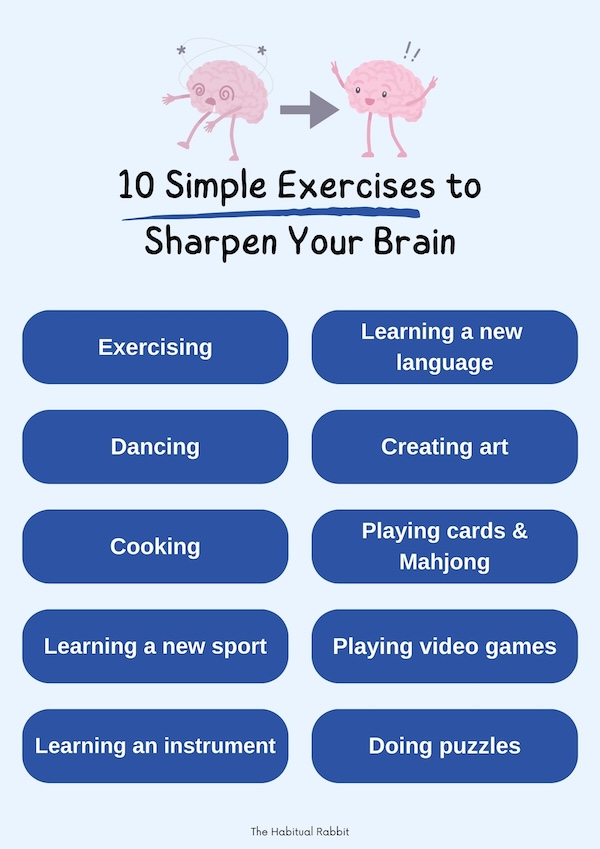
June is Alzheimer’s and Brain Awareness Month! During this time, we raise awareness about cognitive diseases such as Alzheimer’s disease and other forms of dementia. While we should be taking the time to learn about these causes year-round, this month gives us a great opportunity to educate ourselves about brain health, support those affected by the disease, and take steps to maintain optimal brain health.
On a personal note, this is a time for me to honor and remember my late grandmother, who had Alzheimer’s during her final years in this world. My grandma, along with my late mother, was one of the two pillars in my life, who raised me and loved me unconditionally and is a big part of who I am today. I love you and I miss you, grandma.
This article focuses on various exercises that will sharpen your brain and improve cognitive tenacity, but other than these activities, one of the most crucial factors in enhancing cognitive function is our diet. Remember, you are what you eat!
Read our article on the best foods to sharpen your brain!
What Is Brain Training and Why Is It Important?
Brain training, also known as cognitive training, is the process of using mentally engaging activities to strengthen your brain capabilities. Think of training your brain similar to training any muscle of your body; when the brain is passive, it has a tendency to atrophy, just like your muscles if you stop exercising. This means that doing passive activities, such as watching TV for countless hours or scrolling mindlessly through your social media feed, can be detrimental to brain health over time.
Brain training increases neuroplasticity, which is our brain’s ability to change, reorganize, or make new neural connections as we learn from new experiences. Most studies conducted on older adults have shown evidence of improvement in cognitive functions through training a skill or engaging in demanding tasks that provide a sustained cognitive challenge.
Memory exercises can also help delay the loss of cognitive decline. People who participate in these healthy exercises significantly reduce their risk for Alzheimer’s disease, the most common form of dementia.
Without further ado, here are 10 simple exercises to sharpen your brain!
Exercises to Sharpen Your Brain
Exercising
It goes without saying that physical exercise is good for our brain. Exercising improves neuroplasticity, which increases the brain’s capacity to learn. It is also associated with increased activity in the brain’s hippocampus, the part that’s responsible for creating new memories and remembering facts and events. It’s where learning takes place!
Exercise improves our executive functioning capabilities. This is basically our ability to organize and interpret information and act in a way that makes sense. People who exercise regularly are less likely to get Alzheimer’s disease and other forms of dementia because it helps prevent those things linked to it, like depression, diabetes, high blood pressure, and obesity.
Read our article on the recommended workouts to improve brain health!
Dancing
According to the CDC, scientists have found that the areas of the brain that control memory and skills such as planning and organizing are greatly improved with dancing. Who knew! It also improves our coordination and balance. Dancing is not only a fun exercise but is also beneficial for our brain health!
Sign up for a dance class at a nearby dance studio or local community center. If you’re too shy to dance in public, try dancing at home by following various YouTube channels! If you work a remote job, we recommend incorporating dance breaks into your day!
Cooking
Cooking a meal requires several executive functions, including the capacity to multitask, plan, use prospective memory, and maintain and complete overall goals within a strict timeframe — now talk about pressure!
From start to finish, planning a meal requires testing our ability to craft a grocery list, organize, prioritize, sustain focus, solve problems, retrieve memories, and multitask. Cooking also uses several senses — smell, touch, sight, and taste — that involve different parts of the brain.
Try learning how to cook a new cuisine today – you’ll find a slew of delicious, creative recipes through Instagram, TikTok, or a simple Google search!
Learning a new sport
Boosting your balance, strength, and aerobic capacity can help protect your brain against cognitive decline. Learning a new sport as an adult leads to improvements in our motor cortex, which controls how well we can move — something we tend to neglect as we get older.
Yoga, golf, tennis, and swimming are exercises that are known for their brain-boosting benefits. Tennis, for example, fine-tunes your motor skills, and can help you keep your hand-eye coordination sharp. Sports that require a great deal of coordination help to boost your overall brain health!
Learning a new language
Learning a new language can improve cognitive functions by improving memory, problem-solving skills, visuospatial skills, and even creativity. Researchers have shown that the bilingual brain can have better attention and task-switching capacities than the monolingual brain. It’s like being able to access many different parts of your brain at once or various complex layers!
There are so many benefits to being bilingual or multilingual. Bilingual children as young as seven months can better adjust to environmental changes, while bilingual seniors experience less cognitive decline.
An easy way to start is by using language learning apps or online courses, which provide a structured and convenient approach to acquiring a new language. As for Jess and I, we will be using Duolingo to learn Spanish very shortly!
Learning an instrument
Learning how to play an instrument takes many hours of consistent practice, and the brain’s plasticity plays a key role in developing this skill. Learning an instrument taps into both the right and left sides of the brain. Instruments also often require you to perform different tasks with each hand. Learning an instrument decreases the speed of memory loss, increases the speed at which you process information, and improves your planning ability.
As an adult, I’m sure you’re thinking it might be too late to learn an instrument, but that’s all the more reason to start! It’s never too late to learn a new skill, especially if that skill will improve your cognitive function and overall brain health!
Creating art
Creating art involves using many parts of our brain — from those that process our senses to those involved in emotion, memory, and cognition. It expands our creative mind and increases our ability to make connections between unrelated things, expand our perspective, and imagine new ways to communicate.
Art is also a great way to refine motor skills, from coloring, scribbling, and cutting to gluing materials, and is especially useful for anyone recovering from an accident or a stroke. It also significantly increases your dopamine levels and reduces your body’s stress levels.
Playing cards and mahjong
Playing cards or mahjong is an effective way to improve attention, short-term memory, and logical reasoning capability.
In order to win or play well in the game, players need to coordinate and cooperate using their attention, observation, alertness, memory recall, calculation, language, and communication. This also increases the plasticity in your brain as you work through these cognitive challenges.
Since these abilities must be used repeatedly, card games and mahjong help people become mentally sharper by identifying patterns, problem-solving and decision-making, and improve memory. You can’t go wrong with playing these card games: solitaire, bridge, and poker.
Playing video games
Playing different types of video games leads to different types of cognitive improvements. Whether it’s strategy games, role-playing games, or massive multiplayer online games, these all help improve working memory, long-term memory, and reasoning. It also improves attention and concentration, visuospatial skills, and problem-solving.
You know those teenage gamers or young professional gamers in the world of e-sports? Despite the lack of physical activity that many claim is required for a sport, their brain tenacity and cognitive function is of the highest levels.
Don’t tell that to your teenagers who are spending all day playing video games!
Doing puzzles
Engaging in various puzzles, whether it be jigsaw puzzles, crossword puzzles, or sudoku, is one of the best ways to improve cognitive abilities. Puzzles require an undivided focus and attention, which strengthens cognitive functions over time. If you’ve ever done some sort of puzzle, it takes a ton of patience and thinking, all of which contribute to improving perception, visuospatial reasoning, short-term memory, and problem-solving skills.
All of this combats cognitive decline, which reduces the risk of developing dementia.
Final Thoughts
Regardless of which exercises interest you, the brain training exercises you choose should offer both novelty and challenge. It should also be fun! It’s also most ideal to learn in a social environment, whether that’s taking a yoga class or having a monthly board game night with friends. This not only improves brain health, but it also meets our psychological needs for social interactions and a sense of community. Doing things alone is good, but doing things with friends is better.
Remember — repetition is key. Do it consistently, just as you would (and should) with physical exercise, and you will both see and feel the results over time! You’ll thank yourself for taking on these fun challenges in the long run!

